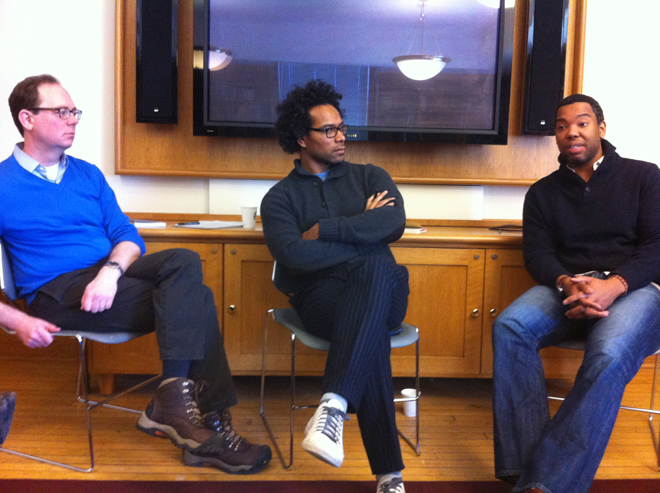Few people write more eloquently on the subject of on race in America than Atlantic writer Ta-Nehisi Coates, who spoke at Northwestern two different times in two different buildings on Thursday – first in University Hall with professors Christopher Bush and Ivy Wilson, then with author and Northwestern senior lecturer Alex Kotlowitz in Annie May Swift Hall. His talks focused not only on the subject of racism (especially as it applies to Coates' travels in France last summer and the recent trial of Michael Dunn) but also on Coates' views on learning and writing.
"I was always curious about things I wanted to be curious about, and it turns out that's a great qualification to be a writer," Coates said during his second talk. "We've gotten to the point where writers are seen as people who stand up and give instructions, but learning is the most important part for me."
More than 130 people from the Evanston/Chicago area crowded into Annie May Swift Hall's auditorium Thursday at 6 p.m. to hear Coates' dialogue with Kotlowitz, co-sponsored by the Center for the Writing Arts, the Department of African-American Studies and the Department of Performance Studies. Kotlowitz said that once a year for the past five years or so, he's brought one other "storyteller" to campus for a dialogue. Last year, for example, he brought StoryCorps founder Dave Isay. Kotlowitz said he has long "relished" Coates' work and decided he would try to bring Coates to campus after meeting him last year.
"I think Ta-Nehisi is the most eloquent voice out there at the moment on race," Kotlowitz said. "And he's one of the few people who's figured out the internet and how to have a civil conversation there, even with a subject as difficult and torturous as race."
Kotlowitz started off by asking Coates about his love of learning and how he developed his blog at The Atlantic. The dialogue got darker and more intense when subsequent questions shifted to America's relationship with its history of slavery and black oppression, one of Coates' primary subjects.
"It's clear that we have a past when we celebrate Fourth of July or appeal to the Founding Fathers," Coates said. "It's only when we are called to account for our past that we don't acknowledge it. We talk about Thomas Jefferson but not his plundering of Sally Hemings' body. We talk about George Washington's bravery and magnanimity but not his lifelong pursuit of the runaway slave Oney Judge. Doing that calls on people to actually do things and sacrifice things, and that's always going to be a problem."
The event attracted not only Northwestern students but Chicagoans as well. Second-year University of Chicago graduate student Clare Delargy said she recently moved to the United States from Ireland and has been reading Coates since she arrived.
"He's the person I've been reading the most since I got here to kind of help me understand the problems of America," Delargy said. "So it was very fascinating to come here and I thought he had really great views and really interesting responses."
After Kotlowitz and Coates talked for about a half hour, they opened the floor for audience questions. Jean-Pierre Brutus, a PhD student in African-American Studies at Northwestern, asked Coates questions at both of his talks. Since the earlier one was primarily organized and sponsored by the Comp Lit Program, it focused more on Coates' series of blog posts he wrote last summer from Paris. Brutus challenged Coates through questions about whether slavery's important role in American history was any different than the role of colonialism in the foundation of European countries. As their talk continued, the "intense curiosity" Coates spoke of earlier became visible as he leaned forward in his chair and asked Brutus to elaborate on certain things.
"I think it was important to have that comeback to him," Brutus said. "It's important to contextualize the US within the greater global framework. Those are things I've been thinking about and I used things from his talk as a point of departure for my own questions. I appreciated his viewpoint – he was thoughtful and gracious about it."
Another audience member at the University Hall talk asked Coates about the presence of both darkness and uplift in his writing. Coates agreed that they were both present. For those prone to extremes, it's possible, after reading Coates' work and listening to him speak, to draw the conclusion that African-American life is terrible and racism insurmountable. An audience member at the dialogue with Kotlowitz went so far as to ask Coates how he could possibly raise a black son in America in 2014, in the wake of both Jordan Davis' and Trayvon Martin's killers walking away without guilty verdicts. Coates, however, used his response to emphatically refute this pessimistic assessment.
"This is the fight," he said. "This is the fight I was born into, and I'm deeply committed to it. You do not have the right to quit. Despite all my invective against white supremacy, we have to live. You have to live."
